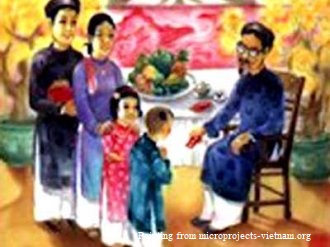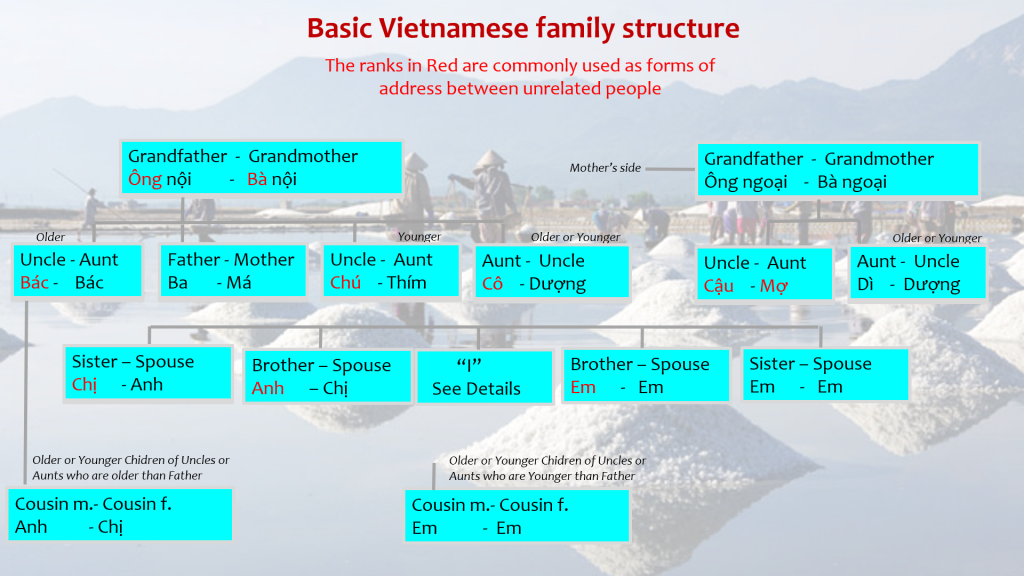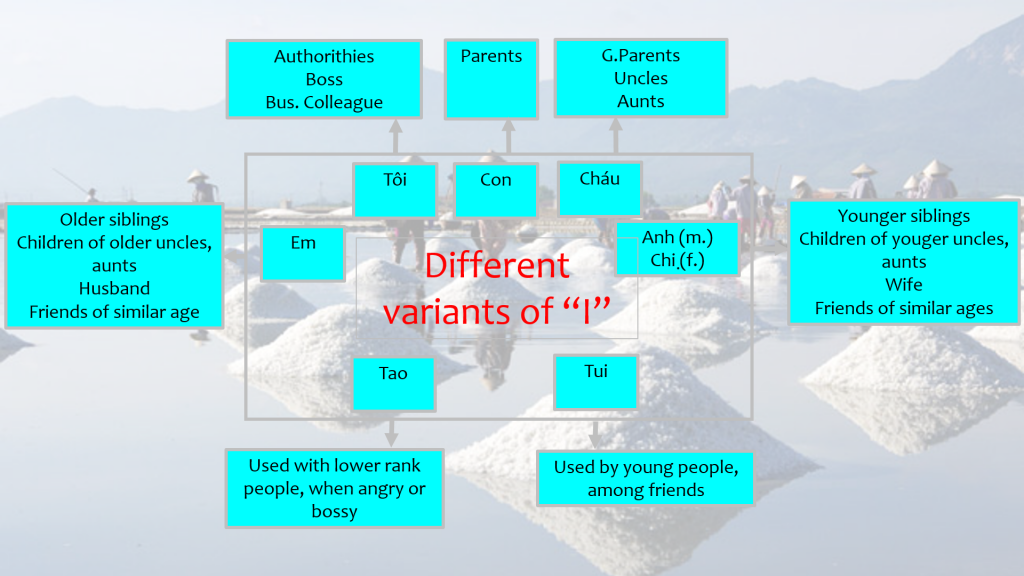Vietnamese Language Tips

Personal Pronouns
In most Western languages the personal pronouns “I, you, he, she…” can be used in almost any circumstance, unless you are addressing the Queen and have to use “Your Majesty” instead of “You”.
Not so in Vietnamese.
Foreigners learning basic Vietnamese are taught the following equivalents:
I – Tôi
You – Bạn
He – Anh ấy
She – Cô ấy
It – Nó
etc.
In reality, these pronouns are rather poor translations and can lead to misunderstandings or even hostile reactions.
“Tôi” is very impersonal, it’s like you just want to be businesslike, nothing more. “Bạn” is “Friend” in English, and, similarly to English, if someone calls you “Friend”, he or she is probably far from being friendly with you. “Anh ấy” or “Cô ấy” must be used with the correct age or rank of the interlocutor, wrong use can be very embarrassing. “Nó” is very impolite and condescending, even when referring to children. No Vietnamese wants to be referred to as “Nó”.
So, what are the correct forms of address in Vietnamese?
Vietnamese use many words to address people, depending on their social ranks or family hierarchies. To chose the proper form of address, you have to know the basic Vietnamese family structure, and some social ranks, then call people, or present yourself, according to the ranks.
The following diagrams and examples will help you navigate that.


Examples:
In English, the same “I”, ‘you” or “she” can be friendly, polite, condescending, hostile, etc. depending on the tone. The same thing applies in Vietnamese, but in addition, the word used also indicates your ̣inner thought.
The following examples are translations of the same phrase
“I need to speak with you about her computer“
Context:
1. Employee speaking to boss
Anyone speaking to officials, authorities
Sentence:
Tôi cần nói chuyện với ông về máy tính của cô ấy
Explanations:
“Ông” is the highest hierarchy in the family structure. Its use shows maximal respect and is recommended for use to address your hierarchical superior
The above translation is acceptable; however, “cô ấy” sounds unnatural in Vietnamese, it’s better to use the person’s name, like:
Tôi cần nói chuyện với ông về máy tính của Mary.
That’s the format we will use in the subsequent translations.
Context:
2. Between business colleagues who are about the same age, but not friends
Sentence:
Tôi cần nói chuyện với anh (chị, cô) về máy tính của Mary
Explanations:
“Anh”, “chị” are older siblings. Even if the colleague is a little younger than you, it’s more polite to use “anh” or “chị”. A caveat, however, if the woman does not want to be treated as older sister, call her “cô” (here “cô” means Miss, not Aunt). It’s similar to the delicate choice between Miss, Ms, or Mrs.
Context:
3. Speaking to an acquaintance who are about your grandparents’ age.
Sentence:
Tôi cần nói chuyện với ông (bà) về máy tính của Mary
Explanations:
See 1. above
Context:
4. Speaking to an acquaintance about your parents’ age.
Sentence:
Tôi cần nói chuyện với bác về máy tính của Mary
Explanations:
“Bác” is your father’s older brother or his wife. Even if the acquaintance is younger than your father, it’s polite to use “Bác”.
Context:
5. Speaking to an acquaintance about your age.
Sentence:
Tôi cần nói chuyện với anh (chị) về máy tính của Mary
Explanations:
“Anh” (chị) is your older sibling. Even if the acquaintance is younger than you, it’s polite to use “Anh”, (chị).
Context:
6. Speaking to a close friend about your grandparents’ age.
Sentence:
Cháu cần nói chuyện với ông (bà) về máy tính của Mary
Explanations:
“Cháu” is less impersonal than “Tôi”, like if you were part of the family.
Context:
7. Speaking to a close friend about your parents’ age.
Sentence:
Cháu cần nói chuyện với Bác về máy tính của Mary
Explanations:
See above
Context:
6. Speaking to a VERY close friend about your age (between men).
Sentence:
Tao cần nói chuyện với mày về máy tính của Mary
Explanations:
This forms of address is not recommended for foreigners. If not said correctly, it can be perceived as rude, impolite. It’s better to use Context 5 above.
Context:
7. Speaking to a close friend about your age (between women).
Sentence:
Jane cần nói chuyện với Lisa về máy tính của Mary
Explanations:
In Vietnamese, it’s common to use first names instead of pronouns, especially between women. It’s also acceptable when a man speaks to a younger woman, but it sounds effeminate between two men.
Context:
8. Between family members
Sentence:
X cần nói chuyện với Y về máy tính của Mary
X and Y are the forms of address in the above diagrams.
“Con” <-> “Ba” (Má)
“Cháu” <-> “Ông”, “Bác”, “Chú”, “Cô”, Cậu”, etc.
“Anh” <-> “Em” (between siblings or husband and wife).
“Chú”, “Cô” <-> “Cháu” (between stranger and children).
Explanations:
Replace X and Y with the forms of address in the above diagrams.
“Ba” has other variants depending on the families, “Bố”, “Cha”. Similar to Dad, Pop, Father.
“Má” is also called “Mẹ”
Some people call themselves “Con” instead of “Cháu” when addressing uncles, aunts
Other forms of address:
Addressing a large, formal audience
Sentence:
Kính chào quý vị
Explanations:
“Respectfully salute you”. “Quý vị” is a word borrowed from Chinese that means “Precious Personality”
Variants of “Tôi”:
“Ta”, “Mình”
Ta cần nói chuyện về máy tính của Mary
“Ta”, “mình” are soliloquy words. When a person speaks to himself, herself
“Chú”
Not recommended, unless asked to use it
It’s not recommended to call a friend who is younger that your father “chú” ( use “bác” instead), unless the person presents himself as “chú” to you. Some people will get offended if they are treated as “junior” to your father.
“Cậu”
Not recommended outside of the family
Example: Tên trộm là một cậu từ X (The thief is a character from X)
“Cậu” used outside of the family is a pejorative word. It’s usually used to call a person who has done something wrong, an unsavory character.
Archaic forms:
Cụ: equivalent to Ông
Lão (old, wise person)
Ngài (royaly, “your majesty”)
Cháu cần nói chuyện với cụ về máy tính của Mary
These are old forms of address that are no longer popular, but still used in written literature or theatrical play.
Young people’ speak:
Tui cần nói chuyện với mày về máy tính của nó
“Tui” is a variant of “Tôi”, “mày” is an impolite “you”, “nó” is a condescending “him, her”.
Condescending, bullying:
Tao cần nói chuyện với mày về máy tính của nó
“Tao” is a variant of “Tôi”, used when someone wants to sound bossy, to bully, or to talk down to the interlocutor. “Mày” is an impolite “you” corresponding to “tao”. “Nó” is a condescending “him, her”.
Although these forms of address are rude, they are used between youngsters, or very close friends. To be avoided by foreigners, because of the danger of misunderstanding.
Plural forms:
There are several ways to turn singular pronouns into plurals:
- Adding “Chúng”: Chúng tôi, chúng nó (or just “Chúng”). “Chúng ta” or “Chúng mình” is used by a group addressing itself (not speaking to a third party).
- Adding “Các”: Các anh, các em, các cô.
- Adding “Bọn” or “Tụi” (used by people referring to themselves, or to refer to others with a hostile undertone. To be avoided): “Tụi em” (we – a group of children calling itself). Tụi nó (They, in hostile term).
- “Họ” (They, when speaking with indifference)
Examples:
- Chúng tôi rất hân hạnh được gặp các anh (We are very pleased to meet you).
- Chúng ta hãy đi ra bãi biển (Let’s go to the beach).
- Tụi nó là kẻ thù (They are enemies) – Underlying sentiment: Expressing hate.
- Họ là người Mỹ (They are Americans) – Underlying sentiment: Just a fact, no emotion.
We hope you’ve enjoyed this tip. Look us up in the near future for new additions.

